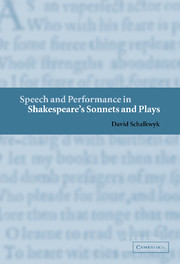Book contents
- Frontmatter
- Contents
- Acknowledgements
- Introduction: the sonnets
- 1 Performatives: the sonnets, Antony and Cleopatra and As You Like It
- 2 Embodiment: the sonnets, Love's Labour's Lost, Romeo and Juliet and Twelfth Night
- 3 Interiority: the sonnets, Hamlet and King Lear
- 4 Names: the sonnets, Romeo and Juliet, Troilus and Cressida and Othello
- 5 Transformations: the sonnets and All's Well that Ends Well
- Conclusion
- Bibliography
- Index
1 - Performatives: the sonnets, Antony and Cleopatra and As You Like It
Published online by Cambridge University Press: 22 September 2009
- Frontmatter
- Contents
- Acknowledgements
- Introduction: the sonnets
- 1 Performatives: the sonnets, Antony and Cleopatra and As You Like It
- 2 Embodiment: the sonnets, Love's Labour's Lost, Romeo and Juliet and Twelfth Night
- 3 Interiority: the sonnets, Hamlet and King Lear
- 4 Names: the sonnets, Romeo and Juliet, Troilus and Cressida and Othello
- 5 Transformations: the sonnets and All's Well that Ends Well
- Conclusion
- Bibliography
- Index
Summary
In the Introduction I argued that it is not fruitful to assume that the rhetorical aims of Shakespeare's sonnets in particular, and early modern Petrarchan poetry in general, are primarily epistemological. Commentators' assumptions about what the language of the sonnets is doing lead them to overlook the ways in which the conditions of address of the sonnet are embodied in particular social and political contexts of performance. I now develop this argument by shifting attention from the generally theatrical notion of performance to the more philosophically technical concept of the performative as a particular trans-generic use of language. Shakespeare's sonnets use language as forms of social action, in a series of performatives through which the power relations between ‘you’ and ‘I’ are negotiated. The Cratylitic identity of word and object (encompassed by the poetics of ‘true vision’), which Joel Fineman sees as the historical essence of epideixis, is neither the central concern of Shakespeare's sonnets nor a dominant view of language in the early modern period. Both the sonnets to the young man (which, in Fineman's view, strive to achieve an epistemological correspondence between word and object) and those to the dark woman (in which he sees the enactment of a Saussurean difference between tongue and sight) are concerned with the exigencies of performance and the performative, rather than the formal and theoretical semiotics of difference.
- Type
- Chapter
- Information
- Publisher: Cambridge University PressPrint publication year: 2002



